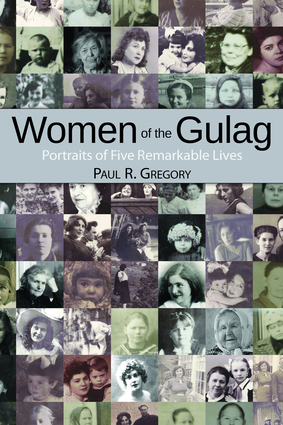

Women of the Gulag
Portraits of Five Remarkable Lives
HISTORY
264 Pages, 6 x 9
Formats: Hardcover, ebook: EPUB, Mobipocket, ebook: PDF
Hardcover, $29.95 (US $29.95) (CA $32.95)
Publication Date: October 2013
ISBN 9780817915742
Overview
During the course of three decades, Joseph Stalin’s Gulag, a vast network of forced labor camps and settlements, held many millions of prisoners. People in every corner of the Soviet Union lived in daily terror of imprisonment and execution. In researching the surviving threads of memoirs and oral reminiscences of five women victimized by the Gulag, author Paul R. Gregory has stitched together a collection of stories from the female perspective, a view in short supply. Capturing the fear, paranoia, and unbearable hardship that were hallmarks of Stalin’s Great Terror, Gregory relates the stories of five women from different social strata and regions in vivid prose, from their pre-Gulag lives, through their struggles to survive in the repressive atmosphere of the late 1930s and early 1940s, to the difficulties facing the four who survived as they adjusted to life after the Gulag. These firsthand accounts illustrate how even the wrong word could become a crime against the state. The book begins with a synopsis of Stalin’s rise to power, the roots of the Gulag, and the scheming and plotting that led to and persisted in one of the bloodiest, most egregious dictatorships of the 20th century.Reviews
“In this carefully researched collection of stories, Paul Gregory portrays a wide range of women Gulag victims, including workers, peasants, intellectuals, even two wives of high officials. His descriptions of their lives—from hard labor and starvation to their search for rehabilitation in later years—leave us with a much fuller picture of what it meant to be female in Stalin's Soviet Union.” —Anne Applebaum, author, Gulag: A History and Iron Curtain: The Crushing of Eastern Europe 1945–1956“Fascinating, heartbreaking, revelatory and important, Paul Gregory's Women of the Gulag is filled with new material and impressive scholarship. Written with sensitivity to both intimate family life and the highest power politics and compelling to general readers as well as experts, the book reveals the brutality and heartlessness of the Stalinist system through the stories of its female victims, both elite and ordinary.” —Simon Sebag Montefiore, author, Stalin: The Court of the Red Tsar
“I am grateful for these stories in Women of the Gulag to jar our memories, to provide a chance for new generations of Russians to look directly into those faces and those eyes, to listen firsthand to their testimony, to start repairing the bridges to that time, which we so desperately must do in order to earn a worthy future.” —Yermolai Solzhenitsyn, coauthor, The Russian Question at the End of the Twentieth Century
"[...] Women of the Gulag tells the fascinating stories of five representative Soviet women—Agnessa, Maria, Evgenia, Adile, and Fekla—drawn from across the class and geographic spectrums of the Soviet empire. Three of these women were connected to the highest echelons of the nomenclatura by marriage, though the common denominator is that all were arrested for the actions of their husbands or fathers." —Vladislav Davidzon, tabletmag.com



